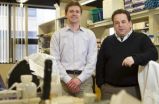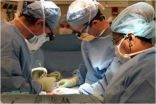(Press-News.org) The American College of Medical Genetics and Genomics (ACMG) released the widely-anticipated "ACMG Recommendations for Reporting of Incidental Findings in Clinical Exome and Genome Sequencing" report at its 2013 Annual Clinical Genetics Meeting today in Phoenix. The ACMG Annual Clinical Genetics Meeting is one of the largest gatherings of medical and health professionals in genetics in the world.
As exome and genome sequencing become more commonly used in medical care, doctors will increasingly be able to learn about genetic changes that increase an individual's risk for developing an unrelated disease. In the past, these incidental genetic findings (unrelated to the condition for which the patient was tested) were seldom provided to the patient.
The ACMG has now created a set of recommendations addressing incidental findings and a minimum list of conditions, genes, and variants that are recommended to be returned whenever clinical sequencing is performed. The ACMG now recommends that for the conditions on the list, the laboratory should return the incidental findings to the doctor ordering the sequencing, and those doctors should manage this information with the patient in the context of that patient's clinical presentation and family history.
Incidental, or secondary, findings, are health-related interpretations of a patient's genetic code that are unrelated to the primary reason for ordering the testing. For example, if an exome or genome sequence were ordered to help diagnose a cardiac condition, there would exist the possibility of finding a different gene that indicated a predisposition for cancer. If the cancer risk were reported to the ordering clinician as an incidental finding, the clinician and patient could explore whether to increase medical surveillance in a way that could catch a cancer earlier and reduce mortality in that patient.
The extensive 27-page report was developed through a year-long consensus process by a Working Group comprised of medical and laboratory geneticists from leading institutions and outside reviewers. The process produced recommendations that were ultimately reviewed and approved by the ACMG Board of Directors, which is comprised of board-certified clinical and laboratory medical genetics healthcare professionals. The report includes detailed recommendations as well as the background and rationale for these recommendations.
Dr. Wayne Grody, FACMG, president of the ACMG said, "This Report is tremendously important because it begins to standardize the process by which the comprehensive power of genomic sequencing can be tailored to optimally benefit patients when clinically important findings not directly related to the primary reason for ordering the test are revealed. We recommend that labs performing clinical exome and genome sequencing recognize and report significant mutations for the serious diseases specified in the Report."
The ACMG report generated a short list of well-understood conditions/genes/variants for which the possibility exists of medical intervention with high benefit to those carrying the variants if they are detected presymptomatically.
Robert C. Green, MD, FACMG, a medical geneticist at Brigham and Women's Hospital and Harvard Medical School, co-chaired the Working Group and was lead author of the Report. "The genome has an extraordinary potential for providing health-related information about both rare and common conditions, but it has been difficult to draw a line and suggest that one set of findings should be part of the medical report and another set should not," said Dr. Green. "In these recommendations, despite a scarcity of clear scientific evidence, we have identified a small number of conditions, genes and variants through consensus that are likely to have a positive impact upon the health of patients and their families if identified incidentally."
Leslie G. Biesecker, MD, FACMG, co-chair of the Working Group, chief of the Genetic Disease Research Branch at the National Human Genome Research Institute said, "The implications of the ACMG recommendations are that as clinical sequencing becomes more widespread, a small percentage of families that are sequenced, perhaps not more than 1-2%, will learn unexpected but potentially life-saving information about an illness they may have never suspected they were at risk for. Thus, these recommendations are an innovative approach to addressing one of the most difficult problems in genomic medicine and to help transition us toward new models of delivering genomic information."
The report concludes: "In summary, the Working Group has recommended that when a report is issued for clinically indicated exome and genome sequencing, a minimum list of conditions, genes and variants should be routinely evaluated and reported to the ordering clinician who can place them into the context of that patient's medical and family history, physical examination and other laboratory testing." It further stated, "The Working Group recognizes that this list should, and will, evolve as further empirical data are collected on the actual penetrance of these variants, and on the health benefits and costs that might follow from their disclosure as incidental findings."
###
The Recommendations will be published at http://www.acmg.net and in a forthcoming edition of Genetics in Medicine, the peer-reviewed journal of the ACMG.
About the ACMG
Founded in 1991, the American College of Medical Genetics and Genomics advances the practice of medical genetics and genomics by providing education, resources and a voice for more than 1600 biochemical, clinical, cytogenetic, medical and molecular geneticists, genetic counselors and other healthcare professionals committed to the practice of medical genetics. ACMG's activities include the development of laboratory and practice standards and guidelines, advocating for quality genetic services in healthcare and in public health, and promoting the development of methods to diagnose, treat and prevent genetic disease. ACMG's website offers a variety of resources including Policy Statements, Practice Guidelines, Educational Resources, and a Find a Geneticist tool. The educational and public health programs of the American College of Medical Genetics are dependent upon charitable gifts from corporations, foundations, and individuals.
ACMG releases report on incidental findings in clinical exome and genome sequencing
ACMG releases highly-anticipated recommendations on incidental findings in clinical exome and genome sequencing
2013-03-21
ELSE PRESS RELEASES FROM THIS DATE:
Can we treat a 'new' coronary heart disease risk factor?
2013-03-21
NEW YORK – Depressive symptoms after heart disease are associated with a markedly increased risk of death or another heart attack. However, less has been known about whether treating heart attack survivors for depressive symptoms could relieve these symptoms, be cost-effective, and ultimately, reduce medical risk? Columbia University Medical Center's Karina W. Davidson, PhD and her research team now report a patient-centered approach that answers these questions in the affirmative.
With a grant from the National Institutes of Health's National Heart, Lung, and Blood Institute ...
Exploring the link between traumatic brain injury and people who are homeless
2013-03-21
TORONTO, March 21, 2013—Homeless people and their health care providers need to know more about traumatic brain injuries to help prevent and treat such injuries, a new study has found.
Homeless people have a disproportionately higher risk for TBI compared to the general population, yet little is known about the severity of those injuries, who exactly is suffering from them and what the long-term consequences are.
"A better understanding of TBI, its presentation and characteristics in the homeless is vital in order to enable appropriate interventions, treatments, and ...
Dysfunction in cerebellar Calcium channel causes motor disorders and epilepsy
2013-03-21
A dysfunction of a certain Calcium channel, the so called P/Q-type channel, in neurons of the cerebellum is sufficient to cause different motor diseases as well as a special type of epilepsy. This is reported by the research team of Dr. Melanie Mark and Prof. Dr. Stefan Herlitze from the Ruhr-Universität Bochum. They investigated mice that lacked the ion channel of the P/Q-type in the modulatory input neurons of the cerebellum. "We expect that our results will contribute to the development of treatments for in particular children and young adults suffering from absence ...
Misregulated genes may have big autism role
2013-03-21
PROVIDENCE, R.I. [Brown University] — A new study finds that two genes individually associated with rare autism-related disorders are also jointly linked to more general forms of autism. The finding suggests a new genetic pathway to investigate in general autism research.
The genes encode the proteins NHE6 and NHE9, which are responsible for biochemical exchanges in the endosomes of cells. Mutations in the NHE6 gene are a direct cause of Christianson Syndrome, while mutations in the NHE9 gene lead to a severe form of autism with epilepsy. In the new study, a statistical ...
Planck's 'child' universe
2013-03-21
"We are very excited, we are finally seeing the concrete results of so many years of hard work". This is how the scientists of the Planck project have commented the first data resulting from the observations carried out by Planck. The mission of the ESA satellite is to observe the past of our Universe, going back in time and reaching the very first instant right after the Big Bang. The image that the Planck scientists convey today is that of a 'child' Universe, dating back to about 380,000 years after the Big Bang, when its temperature was similar to that of the most external ...
Genetic analysis calls for the protection of 2 highly endangered Portuguese fish species
2013-03-21
The two endangered fish species, Squalius aradensis and S. torgalensis, most generally belong to the Cyprinidae, or the carp family. This is the largest fish, and vertebrate family, formed of freshwater fish with a diversity of more than 2,400 species. The family also has an important economic value as a food source. More specifically, the two species studied are members of the subfamily Leuciscinae, formed of small freshwater fish commonly known as minnows. A new genetic study of the two endangered fish was recently published in the open access journal Comparative Cytogenetics.
S. ...
Genetics, age and ethnicity are risk factors in PCa, say experts
2013-03-21
"Are there genetic risk factors for PCa? Yes, and BRCA2 and HOXB13 are useful for predicting high-risk disease," said Jack Cuzick (GB) president of the International Society for Cancer Prevention (ISCaP), referring to the two genes implicated in high-risk prostate disease. Cuzick gave a report on the Consensus Statement for Prostate Cancer Prevention at the closing plenary session of the 28 Annual EAU Congress held in Milan, Italy from March 15 to 19.
"The goal should be to integrate with other protein markers in order to develop risk-adapted screening algorithms," he ...
Novel insights into the evolution of protein networks
2013-03-21
This press release is available in German.
System-wide networks of proteins are indispensable for organisms. Function and evolution of these networks are among the most fascinating research questions in biology. Bioinformatician Thomas Rattei, University of Vienna, and physicist Hernan Makse, City University New York (CUNY), have reconstructed ancestral protein networks. The results are of high interest not only for evolutionary research but also for the interpretation of genome sequence data. Recently, the researchers published their paper in the renowned journal PLOS ...
Planck challenges our understanding of the Universe
2013-03-21
Planck refines our knowledge of the Universe's composition and evolution
New maps provide excellent evidence for our standard model of cosmology
Planck dates Universe at 13.82 billion years old
Anomalies suggest that Universe may be different on scales larger than those we can directly observe
Most accurate values yet for the ingredients of the Universe, with normal matter contributing just 4.9% of the mass/energy density of the Universe and dark matter making up 26.8% - nearly a fifth more than the previous estimate.
Europe's Planck satellite - a flagship mission ...
What you eat before surgery may affect your recovery
2013-03-21
BOSTON, MA—According to a new study, the last few meals before surgery might make a difference in recovery after surgery. Fat tissue is one of the most dominant components that make up the body, and fat tissue is always traumatized during major surgery.
Researchers at Brigham and Women's Hospital (BWH) found that this direct trauma greatly impacts the chemical balance of fat tissue—chemicals that are known to communicate with nearby and distant organs. In the study, mice that consumed a typical Western, high-fat diet showed an exaggerated imbalanced response. Importantly, ...
LAST 30 PRESS RELEASES:
A biological material that becomes stronger when wet could replace plastics
Glacial feast: Seals caught closer to glaciers had fuller stomachs
Get the picture? High-tech, low-cost lens focuses on global consumer markets
Antimicrobial resistance in foodborne bacteria remains a public health concern in Europe
Safer batteries for storing energy at massive scale
How can you rescue a “kidnapped” robot? A new AI system helps the robot regain its sense of location in dynamic, ever-changing environments
Brainwaves of mothers and children synchronize when playing together – even in an acquired language
A holiday to better recovery
Cal Poly’s fifth Climate Solutions Now conference to take place Feb. 23-27
Mask-wearing during COVID-19 linked to reduced air pollution–triggered heart attack risk in Japan
Achieving cross-coupling reactions of fatty amide reduction radicals via iridium-photorelay catalysis and other strategies
Shorter may be sweeter: Study finds 15-second health ads can curb junk food cravings
Family relationships identified in Stone Age graves on Gotland
Effectiveness of exercise to ease osteoarthritis symptoms likely minimal and transient
Cost of copper must rise double to meet basic copper needs
A gel for wounds that won’t heal
Iron, carbon, and the art of toxic cleanup
Organic soil amendments work together to help sandy soils hold water longer, study finds
Hidden carbon in mangrove soils may play a larger role in climate regulation than previously thought
Weight-loss wonder pills prompt scrutiny of key ingredient
Nonprofit leader Diane Dodge to receive 2026 Penn Nursing Renfield Foundation Award for Global Women’s Health
Maternal smoking during pregnancy may be linked to higher blood pressure in children, NIH study finds
New Lund model aims to shorten the path to life-saving cell and gene therapies
Researchers create ultra-stretchable, liquid-repellent materials via laser ablation
Combining AI with OCT shows potential for detecting lipid-rich plaques in coronary arteries
SeaCast revolutionizes Mediterranean Sea forecasting with AI-powered speed and accuracy
JMIR Publications’ JMIR Bioinformatics and Biotechnology invites submissions on Bridging Data, AI, and Innovation to Transform Health
Honey bees navigate more precisely than previously thought
Air pollution may directly contribute to Alzheimer’s disease
Study finds early imaging after pediatric UTIs may do more harm than good
[Press-News.org] ACMG releases report on incidental findings in clinical exome and genome sequencingACMG releases highly-anticipated recommendations on incidental findings in clinical exome and genome sequencing




